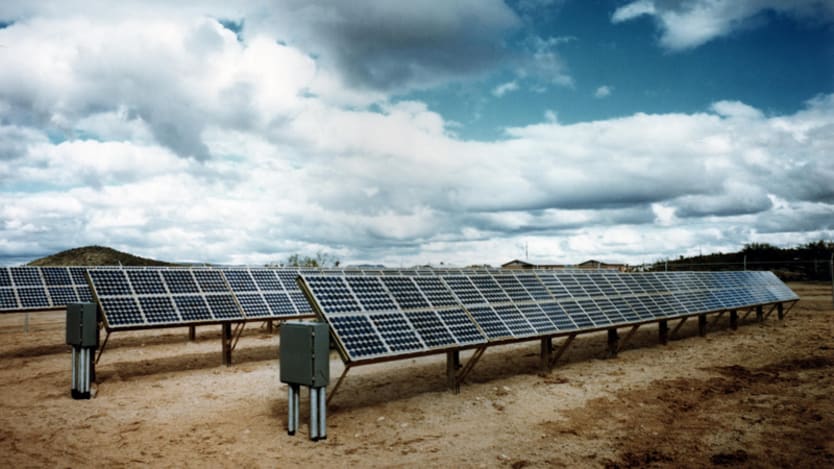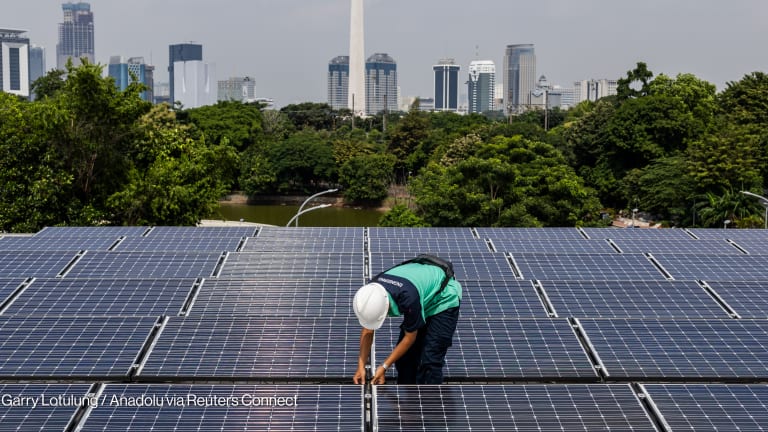
“What now?” was the question Dr Jonathan Pershing, the former U.S. special envoy for climate change who now heads the environment program at the William and Flora Hewlett Foundation, recently put to a room full of Silicon Valley entrepreneurs.
It was one of the weekly open houses at Powerhouse, the first and only incubator and accelerator focused exclusively on enabling solar adoption, where founders of solar software startups gather every Wednesday at a shared office space in Oakland, California.
Since the presidential election, people’s moods at the gatherings have spanned the spectrum from discouragement to determination, as attendees adjust to an administration that seems hostile to their industry. But in some ways, they are also more motivated than ever to carry out their work.
“Everyone around the room said we are just going to keep building these businesses,” Emily Kirsch, cofounder and CEO of Powerhouse, told Devex. “California now, more than ever, has to lead the country.”
Shortly following the election victory of Donald Trump, Kirsch pulled a group of people together for a happy hour, saying they should hope for the best but prepare for the worst regarding U.S. government support for solar energy entrepreneurship. Now she is working with them to build a new coalition that aims to fill some of the gaps that would be left if Trump’s proposed cuts to the U.S. Department of Energy go through. Kirsch represents just one example of the entrepreneurs, investors, cities, states and governments that are moving forward on their commitments to clean energy, even as the White House rolls back climate related funds and regulations.
“We know that this transition to 100 percent renewable energy is inevitable and we’re just doing our part to get there,” she said.
U.S. President Donald Trump has proposed major cuts to the DOE. The Office of Science would lose $900 million of its $5 billion budget, and the Advanced Research Projects Agency-Energy, or ARPA-E, would be eliminated entirely. The final numbers for the proposed fiscal year 2018 budget blueprint will become available in May, at which point they will head to the U.S. Congress for review and debate. But experts tell Devex that now is the time to highlight the importance of the DOE in clean energy innovation in the U.S. and around the world.
“To ensure a clean energy transition, we need dedicated policy support, and a proactive vision of where we’re going,” Justin Guay, climate program officer at the Packard Foundation, said.
While the numbers will be worked out in negotiations, this proposal is important because it reflects Trump’s commitment, or lack thereof, when it comes to the importance of clean energy innovation, he explained.
“To me this is a budget that deconstructs this agency,” he said. “It’s a vision in which the DOE is unnecessary, or the government is unnecessary, and time and again we’ve seen that is just not true for innovation, no matter what sector.”
The DOE has been a leader on advancing a clean energy future, especially when it comes to precommercial innovation, and without that support, the clean energy transition will not happen as quickly as it needs to, said Kristina Skierka, campaign director at Power for All.
“A retreat by the U.S. would send a troubling signal to markets and governments now deciding their future energy path,” she told Devex.
“To ensure a clean energy transition, we need dedicated policy support, and a proactive vision of where we’re going.”
— Justin Guay, climate program officer at the Packard FoundationClean energy is taking off around the world, with China and Germany emerging as two countries that are edging ahead in the race on clean energy innovation, and entrepreneurs in emerging markets are increasingly working on the energy access challenge. But while some of these solutions were developed locally, many of them resulted from breakthroughs that originated in the U.S. and were adapted to local contexts. From the silicon solar cell to more recent technologies, the DOE together with DOE national labs, universities, incubator and accelerator networks, and capital providers, have been critical in providing support to nascent ideas, mobilizing physical research infrastructure, and bringing these innovations to market.
“We're at a critical crossroads for a global energy transition, and national governments in emerging markets weighing future energy options need to be hearing about the immediate impact of renewables,” Skierka said. “Ending energy poverty will continue to require the efforts of the entire international community.”
Bill Gates, the co-founder of Microsoft and co-chair of the Bill & Melinda Gates Foundation, recently visited Caltech professor Nate Lewis, whose research focuses on solar fuel technologies, such as producing hydrogen gas by pumping electricity from solar panels into water. When Gates tweeted a link to details of his visit, he called it “a good reminder of why governments should sponsor research and development (R&D).” The DOE has funded the work Lewis is doing, and because there is not a market for solar fuels, Lewis is concerned that there will not be enough private financing available to match the level of public funding available for work like his.
“Unlike say in information technology or in pharma, we don’t have anything other than DOE,” he told Devex. “The DOE has a role in everything new in energy R&D, from developing a fundamental understanding of why batteries corrode and don’t last as long as we’d like, to identifying new options like fuel from sunlight, to experimenting with other things that may never see the light of day, but we should be thinking of them, because we need options.”
What emerges from the DOE’s Office of Science, the lead federal agency supporting fundamental scientific research for energy, goes to the Office of Energy Efficiency and Renewable Energy. That helps take ideas from experimentation to demonstration through programs such as DOE’s Sunshot Initiative, which funds projects to drive down the cost of solar electricity, and is the model Kirsch and other solar energy entrepreneurs narrowed in on in their open house conversation. Then there is ARPA-E, which funds radical innovation in renewable energy, supporting energy technologies that are too early stage for private sector investment, an approach that experts told Devex is exactly what the government should be doing.
“One thing we can be certain about in the energy world is that it’s always uncertain,” Dr. Ellen Williams, the director of ARPA-E, said in her first public appearance in that role in 2015. “My long-term focus and I think a natural focus for ARPA-E is creating opportunities and options because we don’t know what the future is and what the future’s going to look like.”
She said the case she would make to lawmakers about why an investment in high-risk, high-reward energy technologies is a smart one is the need to invest in the short term and the long term.
“We need to invest on both the short term and the long term. I think the unique model for ARPA-E is focusing on the short term, getting some novel technologies into the marketplace so that they can grow and develop, and that will then give us the long term basis for … our pipeline for underpinning technologies that are going to put us in a position in the future to respond to any shock and to lead the world technologically in energy development.”
Last week, at the Skoll World Forum, speakers at a side event organized by Capricorn Investment Group talked about likely cuts to the DOE in the panel “Investing for Impact: Disruption Beyond Digital.”
Obi Felten, director of moonshots at X, talked about Makani, which is developing energy kites. In May 2013, Makani was acquired by Google, but it got its start in ARPA-E, before moving to “the moonshot factory” to improve its model, a new type of wind turbine. Felten said X can play a role in bridging the gap for ideas that come out of national labs and universities but are not yet fundable, even joking that she could just hire people coming out of ARPA-E, but she emphasized there are limits in what X can do to take these ideas all the way to market.
Dipender Saluja, a partner at Capricorn Investment Group, mentioned a few examples of “people stepping in and doing what is traditionally ARPA-E.” He talked about PRIME Coalition, a public charity working with an expanding group of funders to support early stage companies working to reduce greenhouse gas emissions, and Breakthrough Energy Coalition, a group of investors working with countries that are increasing the size of their government research pipelines. He added that he was reassured when he met the first two employees of Breakthrough Energy Coalition and learned that both came from ARPA-E.
Meanwhile, it’s hard for social entrepreneurs to figure out which of these initiatives to spend time chasing, said Mitra Ardron, whose career has focused on clean technology.
“It’s hard to imagine what a massive time and effort sink it is chasing all these sources of money, almost all of which don't actually turn into anything,” he told Devex via email, noting that this challenge extends from private to public finance and was also a challenge with the DOE. “I believe that once you subtract all the overheads both by the funds, and donors, and by those chasing the funds that very, very little of it actually reaches the energy access efforts on the ground.”
“Development banks and donors need to live up to their promise to end energy poverty, and that will require a massive shift in mindset, an order of magnitude increase in funds as well as technical and capacity-building support for clean energy entrepreneurs, especially those reaching remote, poor populations.”
— Kristina Skierka, campaign director at Power for AllStill, traditional early stage investment vehicles are a poor fit for the energy industry, an Energy Department official told Devex. Energy sector transformation tends to happen over decades, whereas venture capital return expectations are on shorter timescales of less than five years. And industry internal R&D tends to be limited to low-risk activities focused on short-term payback, with the oil companies, for example, focused on their profits, with historically low rates of R&D as a percentage of revenue. By investing $158 million in early-stage small businesses, SunShot has yielded more than $3.4 billion of private follow-on funding, the Energy Department official told Devex, echoing doubts that these emerging new philanthropic initiatives will be able to commit the level of capital that will be needed to support clean energy innovation at scale.
This moment does present an opportunity for global development institutions that might otherwise lack the models, incentives, and opportunities to push the Paris agreement forward to shift their approach, experts told Devex.
“Development banks and donors need to live up to their promise to end energy poverty, and that will require a massive shift in mindset, an order of magnitude increase in funds as well as technical and capacity-building support for clean energy entrepreneurs, especially those reaching remote, poor populations,” Skierka of Power for All said.
But foundations and other actors in the ecosystem cannot be the same scale partners to clean energy innovators and entrepreneurs as government bodies like the DOE.
“We fundamentally can’t fill that void,” Guay of the Packard Foundation said. “On the one hand, there was too little to start with in terms of overarching funding to undergird the amount of R&D you need to be doing to support innovation, and it’s also too much for the amount of philanthropic money going into these issues. So we’re kind of caught in no man’s land.”
He said that between the proposed cuts to the DOE and the promised retreats on international agreements, the U.S. is ceding its ground to the rest of the world.
The U.S. devotes a huge amount of resources to energy R&D, but it is losing its lead, and cuts to the DOE will lead other countries to move ahead, Lewis told Devex.
While the term “valley of death” often comes up in discussions about the role of public sector financing to take innovations from the lab to the field, he uses another analogy to capture the consequences.
“We need to build a bridge over what is otherwise a Grand Canyon just in time so that when we get to that edge we have a bridge, not a chasm, and can get to the other side,” Lewis said.
Stay tuned to Devex for more news and analysis of what the Trump administration means for global development. Read more coverage here and subscribe to The Development Newswire.
Read more stories on funding for clean energy:
► Trump's international climate budget: 'We're not spending money on that anymore'
► US climate envoy is hopeful, but not optimistic
► How Germany's energy transition extends beyond its borders
► What will it take for the new Gates-led clean energy fund to be a breakthrough?








